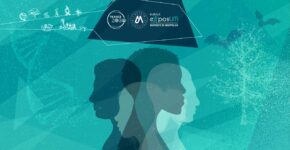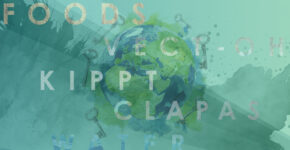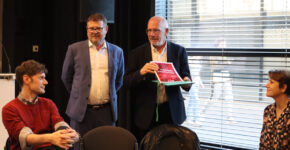Programme d’excellence I-SITE
Labélisé en 2017 et pérennisé en 2022, le programme d’excellence I-SITE mobilise les forces de 16 institutions vers une ambition commune : le rayonnement à Montpellier d’une université thématique de recherche intensive, internationalement reconnue pour son impact sur les enjeux de société que sont la sécurité alimentaire, la protection de l’environnement, et la santé humaine. En 5 ans de période probatoire, des transformations importantes ont été enclenchées dans chacun des grands champs de la vie académique. Ces actions, jusqu’ici portées dans le cadre de la Fondation Montpellier Université d’excellence, sont désormais pleinement intégrées aux activités des directions et services de l’Université de Montpellier.
Ambition scientifique et soutien à la recherche
L’objectif du programme est de répondre à trois défis interdépendants :
- promouvoir une agriculture écologiquement innovante, contribuant à la sécurité alimentaire et à la qualité environnementale ;
- encourager la transition vers une société gérant durablement ses ressources et son milieu ;
- améliorer la santé humaine dans les environnements changeants.
Si les sciences traitant des objets relatifs à l’agriculture, à l’environnement, à la biodiversité, à la biologie et à la santé sont donc au cœur du programme, l’ambition est de poursuivre la transformation de la manière dont nous travaillons et nous amener à construire de nouveaux ponts entre elles et avec les autres disciplines qui font la force du site montpelliérain.
Le programme d’excellence I-SITE finance les quatre Labex prolongés de l’Université de Montpellier (Cemeb, Agro, Entreprendre, NUMEV) et les deux lab’UM, en chimie et épigénétique, qui poursuivent leurs activités jusqu’à leur terme.
Il accompagne la structuration de la recherche à l’échelle du consortium en contribuant au fonctionnement des 5 Pôles de Recherche et de leurs actions d’animation scientifique pour les communautés correspondantes.
Il vise à promouvoir la soumission d’un plus grand nombre de propositions auprès de l’ERC en finançant des actions de sensibilisation, de formation, de soutien à l’écriture de projets ERC.
Le programme d’excellence porte un ambitieux programme de soutien à la recherche et une volonté affirmée d’attractivité scientifique.
Transformation pédagogique et soutien aux innovations
Le volet Formation du Programme d’excellence se déploie sur plusieurs axes.
Première action déployée dès 2017, le collège doctoral de l’Université de Montpellier poursuit ses actions en accord avec la stratégie globale de formation à/par la recherche de l’établissement, au bénéfice de l’ensemble des étudiants des écoles doctorales concernées.
Le programme accompagne la structuration de la formation à l’échelle du consortium qui s’appuiera notamment sur les collégiums nouvellement créés, afin qu’ils promeuvent des actions communes entre les UFR, Écoles et Instituts du consortium, et renforcent la visibilité et la lisibilité de l’offre de formation de l’UM et de ses partenaires.
Le programme soutient également la transformation pédagogique dans tous les établissements d’enseignement supérieur du consortium, par le biais d’actions de sensibilisation et de formation des étudiants aux enjeux de la transition écologique, d’enrichissement des cursus et des pratiques pédagogiques et grâce à l’accompagnement des enseignants-chercheurs par le service commun de soutien aux Innovations pédagogiques.
Le programme d’excellence I-SITE porte le programme de soutien à la transformation pédagogique.
Partenariats stratégiques à l’international et soutien aux activités internationales
Le rayonnement à l’international est un des marqueurs forts de ce programme d’investissement d’avenir. L’Université de Montpellier et ses partenaires du programme d’excellence I-SITE ont choisi de faire vivre des dispositifs thématiques, institutionnels et programmatiques, par des liens privilégiés avec des universités au Nord comme au Sud dans les domaines relevant de leur ambition scientifique. De nombreux partenariats stratégiques tissés permettent d’explorer l’opportunité d’initiatives d’envergure mondiale à l’instar de l’organisation des Montpellier Global Days dans le cadre du Nouveau Sommet Afrique France, de l’Institut des connaissance avancées MAK’IT ou encore des Key World Initiatives autour de thèmes forts du consortium (virus et vecteurs, systèmes alimentaires, eau).
Le programme d’excellence I-SITE porte le programme de mobilités internationales EXPLORE, le programme des Key World Initiatives et l’Institut MAK’IT.
Recherche collaborative et marketing de l’innovation
L’ambition générale est de créer de plus nombreuses connexions, pérennes et de qualité, entre le monde de l’enseignement supérieur et de la recherche et le monde socio-économique.
Le programme d’excellence I-SITE fait converger les partenaires du consortium sur une stratégie commune de partenariats avec les acteurs économiques afin d’encourager les innovations technologiques ou sociétales. Tous les efforts sont mises en œuvre pour que les acteurs de l’écosystème de l’innovation travaillent en synergie et en complémentarité en matière de développement des compétences, de marketing de l’innovation, de rapprochement des processus…
Le programme d’excellence I-SITE soutient le programme Companies and campus et le booster de l’innovation.
Initiatives étudiantes
Afin de proposer des actions venant en complémentarité des dispositifs existants, la programmation du programme d’excellence I-SITE pour la vie étudiante a pour objectif de favoriser l’interculturalité chez les étudiants. Cet objectif participe à l’atteinte d’un des engagements post période probatoire du projet MUSE qui vise à favoriser l’internationalisation des formations. Dans ce contexte, il s’agit d’offrir aux étudiants la possibilité de mettre en pratique leurs connaissances en anglais ou de l’améliorer en dehors de leur formation, tout en leur permettant de développer une ouverture interculturelle.
Le programme d’excellence I-ISITE porte le programme de soutien aux initiatives étudiantes.
Culture scientifique
Cette action concerne le renforcement des initiatives de partage des savoirs et dialogues, mais aussi de partage des méthodes, résultats, enjeux et questionnement scientifiques, destinés spécifiquement à un public jeune ou scolaire. Les actions de diffusion de la culture scientifique seront déployées en lien avec “la recherche en train de se faire” au sein du consortium.
Le programme d’excellence I-ISITE porte le programme de soutien aux actions de culture scientifique.
Le dispositif IDEX/ISITE, imaginé en 2010 dans le cadre du Programme d’Investissements d’Avenir, vise à faire émerger en France un nombre limité d’Universités de recherche sur des sites riches d’un potentiel scientifique remarquable et capables de créer une synergie entre universités, écoles, organismes de recherche et, le cas échéant, établissements de santé et entreprises.
Le comité des investissements stratégiques et structurants est présidé par le président de l’Université de Montpellier et comprend des représentants des établissements : Université de Montpellier, l’établissement-composante ENSCM, l’Institut Agro, le CIRAD, le CHU de Montpellier, le CHU de Nîmes, le CNRS, le CEA, l’ICM, l’INRAE, l’INSERM, l’IRD, et un représentant désigné conjointement par le BRGM, le CIHEAM IAM, l’IFREMER et l’INRIA.




